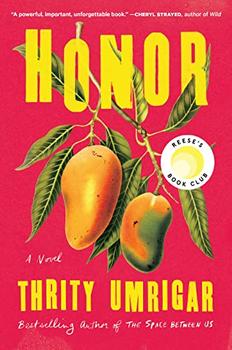Summary | Excerpt | Reading Guide | Discuss | Reviews | Beyond the Book | Read-Alikes | Genres & Themes | Author Bio

This article relates to Honor
At the time of the partition in 1947, what was once the British colony of India was split, separating the predominantly Hindu Dominion of India (modern-day Republic of India) from the predominantly Muslim Dominion of Pakistan (modern-day Pakistan and Bangladesh). Prime Minister Jawaharlal Nehru envisaged India as a secular socialist democratic republic. Sadly, his vision did not endure, and anti-Muslim sentiment and violence have been a constant, increasingly so since the early 1990s. This issue is captured vividly in Thrity Umrigar's novel Honor, which centers around a Hindu woman who is suing her brothers for murdering her Muslim husband.
India is constitutionally secular, and the population is roughly 84% Hindu and 14% Muslim. Religious extremists have established a movement intended to make Hinduism the official religion, and in the process, further the persecution of Muslims. In December 2021, hundreds of these extremists gathered at a conference in Haridwar, where speakers called for the murder of Muslims residing in India. One stated, "If 100 of us are ready to kill two million of them, then we will win and make India a Hindu nation."
Anti-Muslim sentiments are not relegated entirely to the expressions of extremists, however; they are codified into Indian law. Interfaith marriages like the one depicted in Honor are relatively uncommon in India, and new laws like the Prohibition of Unlawful Conversion Ordinance have been drafted to expressly forbid such relationships. In 2019, the Indian parliament passed the Citizenship Amendment Act, which fast-tracks citizenship for immigrants from Afghanistan, Bangladesh and Pakistan, but only those who are not Muslim. Critics argue that the law is unconstitutional, as it "infringes on Articles 14 and 15, which guarantee equality before the law and non-discrimination on religious grounds." It was met with widespread protest, including an event in Assam that left five people dead and another in New Delhi where more than 50 were killed, with the majority of the dead being Muslims. Amnesty International accused New Delhi police of human rights violations in the aftermath of the clash, citing a long history of brutality, hate speech and torture against protesters.
In September 2021, over 5,000 Muslims had their homes razed in Dholpur, having been declared "illegal encroachers" by the government. Two mosques and a madrassa were also destroyed, and the displaced families were subsequently homeless.
Indian Prime Minister Narendra Modi, and others in the Bharatiya Janata Party (BJP) to which he belongs, have been accused by many of fomenting these sentiments by casting the blame for India's economic and cultural woes upon Muslims. The result is a situation rife with extremism and everyday acts of violence under the pretense of vigilantism. Because the Hindu religion views cows as sacred, Hindu nationalists have made protection of the animals one of their causes. Muslims involved in the cattle industry have frequently been accused of violating anti-cattle slaughter laws and subsequently been attacked by lynch mobs, according to a report by Human Rights Watch. Pakistan's Prime Minister Imran Khan has accused Modi of "unleashing a reign of fear and violence against India's 200 million-strong Muslim community."
The BJP's anti-Muslim rhetoric has been escalating since 1989 when the party began espousing Hindutva, a nationalistic and religious ideology. Hindutva rhetoric has been held responsible for the destruction of the Babri Masjid mosque in 1992 and the series of violent riots that followed. This incident has been called a "watershed moment in designating the subordinate existence of Muslims as Indians." Right-wing, populist political messaging blaming a minority for social and economic problems has led to bloodshed frequently throughout history, causing some to wonder if the current state of anti-Muslim sentiment in India is a precursor to genocide.
Filed under Places, Cultures & Identities
![]() This "beyond the book article" relates to Honor. It originally ran in January 2022 and has been updated for the
January 2022 edition.
Go to magazine.
This "beyond the book article" relates to Honor. It originally ran in January 2022 and has been updated for the
January 2022 edition.
Go to magazine.
Your guide toexceptional books
BookBrowse seeks out and recommends the best in contemporary fiction and nonfiction—books that not only engage and entertain but also deepen our understanding of ourselves and the world around us.